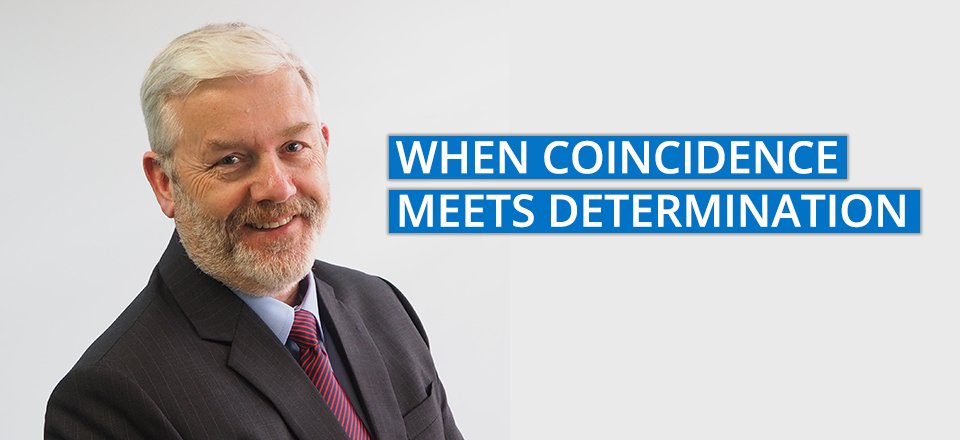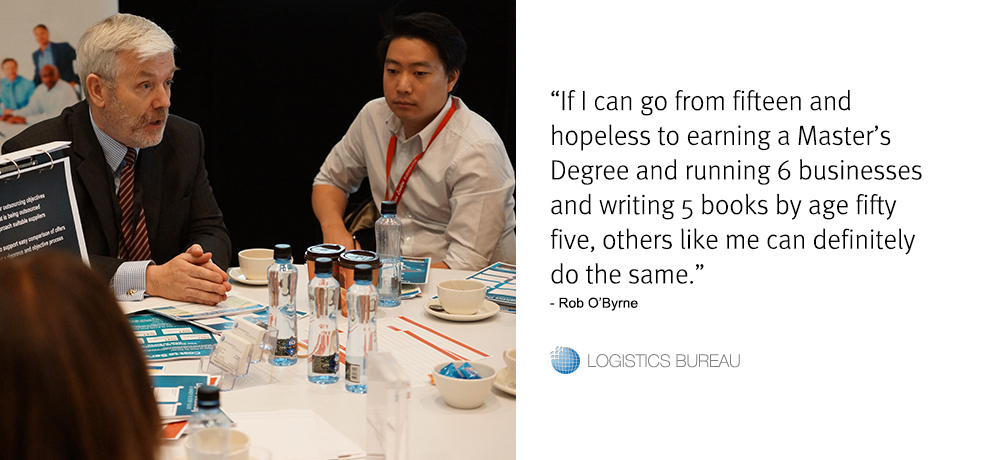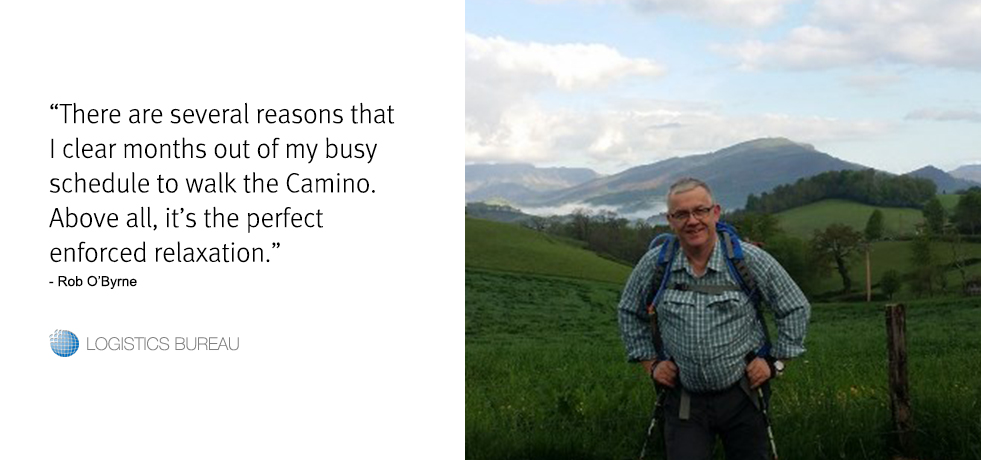
Last year, one of my team at Logistics Bureau conducted a few interviews of our senior staff.
To my horror they asked me too!
This is how it turned out…………….
1. Rob, you grew up on the British island of Jersey, just off the coast from Normandy, France. In 1993 you left UK for Australia. What prompted the move Down Under?
I had worked in the British Army for about twenty years in several senior supply chain and logistics related roles. As the Cold War tensions subsided the Army started to downsize. I was offered an early retirement package which I accepted and then used to pay for a deposit on a house in Sydney. My family and I were ready to try something new and my itchy feet told me this was the time to do it. We came out in December of 1993. A month after our arrival I was hired by Mark Dawson to head up the Sydney office of Dawson Consulting. I loved getting into consultancy and learning from Mark. I quickly found my feet and became a proud Australian citizen in 1997.

Rob is a firm believer in helping others through (in)formal education.
2. Over the years you’ve managed to bring multiple management consulting firms and related businesses together under the Logistics Bureau Group umbrella. Was this an ambition from the start or did it just ‘happen’?
It was always the intention to have a Group with Logistics Bureau as the main pillar. When I co-founded Logistics Bureau in 1997 we drew up an org chart with about thirty people in it. There were two of us. Over the years other names filled in the blanks. Logistics Bureau came about over a bottle of wine. We wanted a bureau of services, including management consulting, recruiting, training and systems. It had to be a one-stop shop. We tried a few things in the early days like starting our own recruitment company and training business. The business lesson for us was that we can’t get too distracted from the game.
The acquisitions of Benchmarking Success and Dawson Consulting added great complimentary value to our core business. Later we expanded into Southeast Asia and eventually opted for a model of centralised technical support in Sydney and consultants on the ground on a project basis. In more recent years, our focus on education has grown. Not to the detriment of consulting, though, but really in addition to. Over the last five to ten years we’ve become clearer about our purpose. We believe people deserve better outcomes. For us, that includes not only our clients and inner staff, but those less privileged as well. It’s why we do what we do.
3. As you mentioned, one of your business interests revolves around education. Whether it’s helping supply chain professionals boost their knowledge or organising public supply chain coaching events, you’re a firm believer in helping others through (in)formal education. What fuels this passion of yours?
From an education point of view my childhood was a bit of a disaster. I was often called stupid, sent off to detention and got into all sorts of trouble. At age fifteen I was even thrown out of school. My parents probably thought I would go off the rails. I decided to join the military high school. Here I was fortunate that my commanding officer mentored me and helped me get into various educational programs. In the process, I became much more confident. Heck, I even made it to Cranfield University where I graduated second in the Master of Science in Logistics.
That whole transition was very much the result of having received good mentoring and being pushed to want more. After university I even started teaching at the Army’s Logistics School. In subsequent teaching roles I’ve always been looking for that spark in my pupils, especially the ones that struggle. With good support they can achieve a good thing. If I can go from fifteen and hopeless to earning a Master’s Degree and running 6 businesses and writing 5 books by age fifty five, others like me can definitely do the same – or better. I consider it a calling to help them achieve their own dreams.
4. In 2012, Logistics Bureau Group established a virtual assistant service in the Southern Philippines: Virtual Done Well. You’ve described it as a social enterprise that provides long term career opportunities, especially for young professionals, in an area where ‘good jobs’ are hard to come by, Why a virtual assistant (VA) business and why in the Philippines?
Most things in my life happen by coincidence and Virtual Done Well is no exception. I think it was in 2010 that I was at a seminar listening to someone pitching a VA business. At the time the big thing for small businesses was to outsource their back office. We decided we could use some help with our online marketing and ended up hiring three staff based in Davao City in the Philippines. All three became valued employees and even friends. Then cracks started to appear in the outsourcing organisation where they were employed. It turned out not to be as great as portrayed. We reached an agreement that they would serve out their contracts and then start out on their own as part of Logistics Bureau. That’s how Virtual Done Well, or VDW, was born. The team grew gradually to the thirty people that work there today.
It became clear quite quickly that the focus of the business was never going to be on making a profit. For that to happen it would need to operate on a very large scale. Also, it morally didn’t feel like the type of business to cream profits from. As we learned more about the local job market and career opportunities, we realised that the social enterprise model was the way to go. With VDW we deliver good quality services and look after our staff. They receive very competitive salaries, health insurance and perks like gym membership and monthly team lunches. And if there is spare money, the intention is always to share that in the local community.
We recently celebrated our 6 year anniversary (there’s a video on the VDW Facebook page). It’s really cool to see what a coincidental seminar visit can lead to in a few years’ time. I’ve become very fond of our overseas staff in Davao. It’s a great joy and privilege to help them reach their full potential.

Rob recently started training for his third Camino pilgrimage walk across Spain. This year his wife Pat is joining him for the full 800 km.
5. In the same year Virtual Done Well got started, Logistics Bureau became partners with the global charity giving program B1G1. Since 2012, by giving on behalf of customers through B1G1, you have impacted the lives of millions of people around the world. I know you don’t like to be expressive about your giving efforts, but helping those less fortunate is a big part of why you are in business. Tell us a little bit about why B1G1 is such a good fit for Logistics Bureau.
The short version of that answer is that B1G1 is transparent, effective and genuinely passionate about making a positive impact in the lives of those less fortunate. They’ve found a way to leverage the collective power of a lot of small companies habitually making small donations. I first learned about them at a seminar where the chairman of B1G1, Paul Dunn, talked about how businesses could get focused and do a lot of good at the same time. I was the first in the queue to sign up and I set up my account the same day. Later that night I got an email from Paul saying “Hey, you’ve only been a member for 3 hours and you’ve already donated!” It felt right from the start and the partnership is a perfect fit with our culture. In fact, we now routinely incorporate giving on behalf of clients in our consultancy business, education programs and social enterprise services. It has made us clearer in our purpose.
6. You’ve recently starting training again for the pilgrimage walk across Spain – the Camino de Santigao. You first did the Camino in 2015 and then again in 2016. That year your wife Pat joined you for the first 120 km, this year you’re doing the full 800 km together. What’s the biggest difference between walking solo and as a couple?
It’s really a totally different experience. When you walk alone you interact more with others around you. The Camino is a revolving family of people, of passing ships in the night, so to speak. On your own there’s more of a natural tendency to connect. That being said, Pat and I have a walking routine that allows both of us to be reflective of our environment; we don’t walk at the same pace. We stay in sight of each other, but only during breaks do we get together. It’s what works for us and if you’re on the road for weeks on end, that’s exactly what you need.
There are several reasons that I clear months out of my busy schedule to walk the Camino. There’s the physical challenge aspect, of course. But above all, it’s the perfect enforced relaxation. You can’t put me on a beach and expect me to totally switch off from work. I don’t think my ADD would allow it… Next time I walk solo again I might start in Le Puy, near Lyon in France. That’s a 1600 km hike to Santiago de Compostela. We’ll see. As always, I’ll put my faith in coincidence and determination; both have served me well so far.
You can get in touch with me directly at +61 417 417 307 or shooting an email. Love to hear from you!
Editor’s Note: This post was originally published in March 2018, under the title “When Coincidence Meets Determination – An Interview with Rob O’Byrne” in Logistics Bureau’s website.


